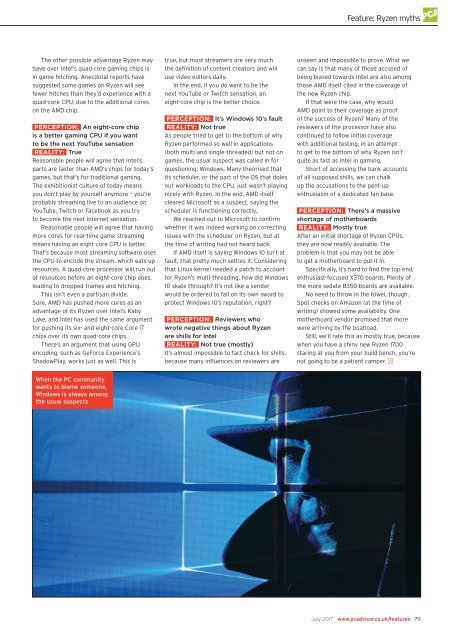Create successful ePaper yourself
Turn your PDF publications into a flip-book with our unique Google optimized e-Paper software.
Feature: Ryzen myths<br />
The other possible advantage Ryzen may<br />
have over Intel’s quad-core gaming chips is<br />
in game hitching. Anecdotal reports have<br />
suggested some games on Ryzen will see<br />
fewer hitches than they’d experience with a<br />
quad-core CPU, due to the additional cores<br />
on the AMD chip.<br />
PercePtion: An eight-core chip<br />
is a better gaming CPU if you want<br />
to be the next YouTube sensation<br />
reality: True<br />
Reasonable people will agree that Intel’s<br />
parts are faster than AMD’s chips for today’s<br />
games, but that’s for traditional gaming.<br />
The exhibitionist culture of today means<br />
you don’t play by yourself anymore – you’re<br />
probably streaming live to an audience on<br />
YouTube, Twitch or Facebook as you try<br />
to become the next internet sensation.<br />
Reasonable people will agree that having<br />
more cores for real-time game streaming<br />
means having an eight-core CPU is better.<br />
That’s because most streaming software uses<br />
the CPU to encode the stream, which eats up<br />
resources. A quad-core processor will run out<br />
of resources before an eight-core chip does,<br />
leading to dropped frames and hitching.<br />
This isn’t even a partisan divide.<br />
Sure, AMD has pushed more cores as an<br />
advantage of its Ryzen over Intel’s Kaby<br />
Lake, and Intel has used the same argument<br />
for pushing its six- and eight-core Core i7<br />
chips over its own quad-core chips.<br />
There’s an argument that using GPU<br />
encoding, such as GeForce Experience’s<br />
ShadowPlay, works just as well. This is<br />
true, but most streamers are very much<br />
the definition of content creators and will<br />
use video editors daily.<br />
In the end, if you do want to be the<br />
next YouTube or Twitch sensation, an<br />
eight-core chip is the better choice.<br />
PercePtion: It’s Windows 10’s fault<br />
reality: Not true<br />
As people tried to get to the bottom of why<br />
Ryzen performed so well in applications<br />
(both multi-and single-threaded) but not on<br />
games, the usual suspect was called in for<br />
questioning: Windows. Many theorised that<br />
its scheduler, or the part of the OS that doles<br />
out workloads to the CPU, just wasn’t playing<br />
nicely with Ryzen. In the end, AMD itself<br />
cleared Microsoft as a suspect, saying the<br />
scheduler is functioning correctly.<br />
We reached out to Microsoft to confirm<br />
whether it was indeed working on correcting<br />
issues with the scheduler on Ryzen, but at<br />
the time of writing had not heard back.<br />
If AMD itself is saying Windows 10 isn’t at<br />
fault, that pretty much settles it. Considering<br />
that Linux kernel needed a patch to account<br />
for Ryzen’s multi-threading, how did Windows<br />
10 skate through? It’s not like a vendor<br />
would be ordered to fall on its own sword to<br />
protect Windows 10’s reputation, right?<br />
PercePtion: Reviewers who<br />
wrote negative things about Ryzen<br />
are shills for Intel<br />
reality: Not true (mostly)<br />
It’s almost impossible to fact check for shills,<br />
because many influences on reviewers are<br />
unseen and impossible to prove. What we<br />
can say is that many of those accused of<br />
being biased towards Intel are also among<br />
those AMD itself cited in the coverage of<br />
the new Ryzen chip.<br />
If that were the case, why would<br />
AMD point to their coverage as proof<br />
of the success of Ryzen? Many of the<br />
reviewers of the processor have also<br />
continued to follow initial coverage<br />
with additional testing, in an attempt<br />
to get to the bottom of why Ryzen isn’t<br />
quite as fast as Intel in gaming.<br />
Short of accessing the bank accounts<br />
of all supposed shills, we can chalk<br />
up the accusations to the pent-up<br />
enthusiasm of a dedicated fan base.<br />
PercePtion: There’s a massive<br />
shortage of motherboards<br />
reality: Mostly true<br />
After an initial shortage of Ryzen CPUs,<br />
they are now readily available. The<br />
problem is that you may not be able<br />
to get a motherboard to put it in.<br />
Specifically, it’s hard to find the top-end,<br />
enthusiast-focused X370 boards. Plenty of<br />
the more sedate B350 boards are available.<br />
No need to throw in the towel, though.<br />
Spot checks on Amazon (at the time of<br />
writing) showed some availability. One<br />
motherboard vendor promised that more<br />
were arriving by the boatload.<br />
Still, we’ll rate this as mostly true, because<br />
when you have a shiny new Ryzen 1700<br />
staring at you from your build bench, you’re<br />
not going to be a patient camper. J<br />
When the <strong>PC</strong> community<br />
wants to blame someone,<br />
Windows is always among<br />
the usual suspects<br />
<strong>July</strong> <strong>2017</strong> www.pcadvisor.co.uk/features 79


















